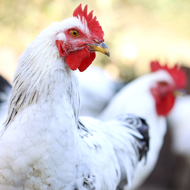Consumers "should be better informed" about slaughter

Just 11 per cent feel the public understands the difference between stunned and non-stunned slaughter.
The vast majority of vets think consumers need a better understanding of slaughter methods, according to new BVA figures. Very few vets believe members of the public understand the difference between stunned and non-stunned slaughter.
Figures on vets' attitudes to slaughter have been released to coincide with a parliamentary debate taking place today (November 4), on the slaughter of animals in accordance with religious rites.
According to the Voice of the Veterinary Profession survey findings, 94 per cent of vets believe consumers should be better informed, and just 11 per cent feel the public understands the difference between stunned and non-stunned slaughter.
Earlier this year the BVA launched a #stunb4slaughter campaign which calls for an end to non-stun slaughter for animal welfare reasons. Its government e-petition is nearing 80,000 signatures.
Current UK and EU law requires animals to be stunned, rendering them insensible to pain, before slaughter. An exception in the law allows animals to be slaughtered without pre-stunning among some religious communities.
Meat labelling will be discussed at the parliamentary meeting secured by Neil Parish MP today. MPs will not vote at the end of the debate, but BVA hopes its e-petition will garner 100,000 votes, triggering a full parliamentary debate with a vote.
BVA president John Blackwell said: "There is much more to be done to educate the general public about welfare at slaughter. We know that UK consumers care about animal welfare but our members believe that there needs to be better understanding about methods of slaughter and how that impacts on welfare.
"We believe labelling that clearly explains the method of slaughter would help all consumers make informed choices about the products they wish to buy."



 The Veterinary Medicines Directorate (VMD) is inviting applications from veterinary students to attend a one-week extramural studies (EMS) placement in July 2026.
The Veterinary Medicines Directorate (VMD) is inviting applications from veterinary students to attend a one-week extramural studies (EMS) placement in July 2026.